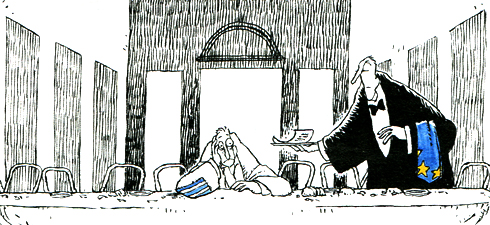Dramatic challenges, and mediocre responses: that is the history of the European Union. All too rarely does the EU rise to the level of events, which is why Europe is fading economically and geopolitically.
The 1958 Treaty of Rome, which established the European Economic Community, was Europe’s great leap forward. But the decision to create a common market without a common government was simply storing up trouble for the future. Everything since – enlargement to 27 member states and the creation of the 16-member euro-zone – has widened the gap between rhetoric and reality. Euroland has gone on promising far more than its history enables it to deliver.
The Greek financial crisis is the latest example of the gap between reality and rhetoric. At root, it is a crisis of “enlargement,” in this case enlargement of the euro-zone. Unprecedented effort at fiscal discipline in the 1990’s – helped in Greece by creative accounting – enabled Portugal, Italy, Greece, and Spain (disobligingly known as the PIGS) to meet the entry criteria in 2002. But once in, the pressure was off. Most of the Mediterranean countries continued on their spendthrift ways, confident that the markets would not call them to account.
Now Wolfgang Schauble, Germany’s Finance Minister, has said enough is enough. He advocates setting up a European Monetary Fund (EMF) to provide emergency lending to countries at risk of default on their sovereign debt. Emergency lending would come with a “prohibitive price tag,” “strict conditions,” and “mandatory penalties” in the event of non-compliance. Read full article atProject Syndicate...
From Germany
Iron Chancellor lays down the law
While Spiegel-Online announces Angela Merkel's "imminent victory" on the Greek crisis, notably in the light of French support for an "IMF solution," Frankfurter Allgemeine Zeitung leads with a report on a major shift in EU policy. In proposing to exclude non compliant countries from the euro zone, Germany for the first time "has openly acknowledged that it is unwilling to pay an exorbitant price for European integration." At the start of her mandate, the Chancellor, who bankrolled millions of euros in grants to keep the peace with Poland and "emphasized European cohesion over German interests," was intent on following in the footsteps of the architect of German reunification Helmut Kohl. However today, Mrs Merkel has changed her tune to "apply a hard nosed policy, which resembles the position typically adopted by the UK."
From now on, the conservative daily explains, the guiding principle in Berlin is: "the German people should take priority over Europe." That is why Mrs Merkel will "not display the level of flexibility that her southern European colleagues are hoping to see" at the European Council on the 25 and 26 of March. "She is now the governor of a country, which is no longer enchanted by the ideal of European integration. Germany's conviction that it has to buy a free lunch for Europe […] has contributed to the emergence of euroscepticism." A change that amounts to "a severe blow for Europe that will likely have more impact than changes brought about by European treaties," remarks FAZ. The European old guard, who continue to defend the concept of the EU as a union for the promotion of peace and stability, will likely be concerned by this change in attitude. However, at the same time FAZ insists that the EU has grown too big to be supported by Germany alone.
Was this article useful? If so we are delighted!
It is freely available because we believe that the right to free and independent information is essential for democracy. But this right is not guaranteed forever, and independence comes at a cost. We need your support in order to continue publishing independent, multilingual news for all Europeans.
Discover our subscription offers and their exclusive benefits and become a member of our community now!












